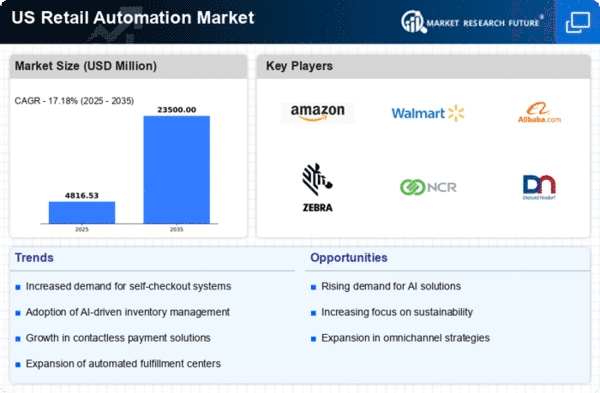Top Industry Leaders in the US Retail Automation Market

US Retail Automation Market: Dive into the Latest News and Updates
The American retail landscape is witnessing a surge in automation, transforming operations from self-checkout kiosks to robotic inventory management.
Some of US Retail Automation Companies Listed Below:
- Datalogic S.p.A
- KUKA AG
- Zebra Technologies Corporation
- Fujitsu Limited
- NCR Corporation
- Samsung Electronics Co. Ltd.
- Posiflex Technology, Inc.
- Tecsys Inc.
- Optimove Inc.
- Capillary Technologies
- Honeywell International Inc.
- Focus Softnet FZ LLC
- Future Way Technical Services LLC
- QR Retail Automation (Asia) Sdn Bhd
- Microlistics
- First Data Corporation
- E&K Automation GmbH
- Napse
- Vinculum Solutions Pvt. Ltd.
Strategies Fueling Growth in the US Retail Automation Market:
- Focus on ROI and Cost-Effectiveness: Demonstrating clear return on investment through reduced labor costs, improved efficiency, and increased sales is crucial for gaining retailer buy-in.
- Flexibility and Customization: Adapting solutions to fit diverse retail formats, store sizes, and customer preferences is essential for broader adoption across the US market.
- Openness and Integration: Ensuring seamless integration with existing IT infrastructure and other automation solutions unlocks maximum value and facilitates data exchange.
- Customer Experience Optimization: Automation solutions should enhance the customer experience, not detract from it, by offering convenience, speed, and personalized interactions.
Factors Influencing Market Share Analysis:
- Target Retail Segment: Understanding the unique needs and challenges of different segments, such as grocery stores, apparel retailers, or convenience stores, is crucial for tailoring solutions and achieving success.
- Technology Maturity and Performance: The reliability, accuracy, and efficiency of automation solutions directly impact their adoption and influence market share.
- Data Security and Privacy Concerns: Implementing robust security measures and ensuring data privacy compliance are essential for gaining retailer and customer trust.
- Labor Market Dynamics and Employment Concerns: Addressing job displacement concerns and implementing responsible automation strategies are crucial for market acceptance and social sustainability.
Emerging Companies and Innovation Trends:
- AI and Machine Learning Integration: Advanced AI and machine learning capabilities enable tasks like predictive maintenance, dynamic inventory optimization, and personalized product recommendations.
- Robotic Fulfillment and Delivery: Advancements in robotics pave the way for automated order picking, packing, and even delivery, transforming logistics and last-mile fulfillment.
- Frictionless Shopping Experiences: Technologies like cashierless stores, smart fitting rooms, and voice-activated shopping aim to create seamless and convenient shopping experiences.
Current Investment Trends:
- Venture Capital Funding: Innovative startups developing cutting-edge automation solutions are attracting significant venture capital funding, fueling market growth and diversification.
- Strategic Investments and Acquisitions: Established players are investing in promising startups or acquiring niche expertise to expand their offerings and strengthen their market positions.
- Retailer-Led Innovation: Major retailers are increasingly investing in building their own automation capabilities and collaborating with technology partners for custom solutions.
Latest Company Updates:
- January 2024: Amazon Go opens its first cashierless grocery store in Seattle, marking a significant expansion of its grab-and-go technology.
- December 2023: Walmart unveils its "Store of the Future" concept, which features a variety of automation technologies including self-checkout kiosks, robotic shelf-scanning systems, and automated delivery drones.
- November 2023: Kroger partners with Swisslog to deploy automated guided vehicles (AGVs) in its warehouses to improve efficiency and reduce costs.










